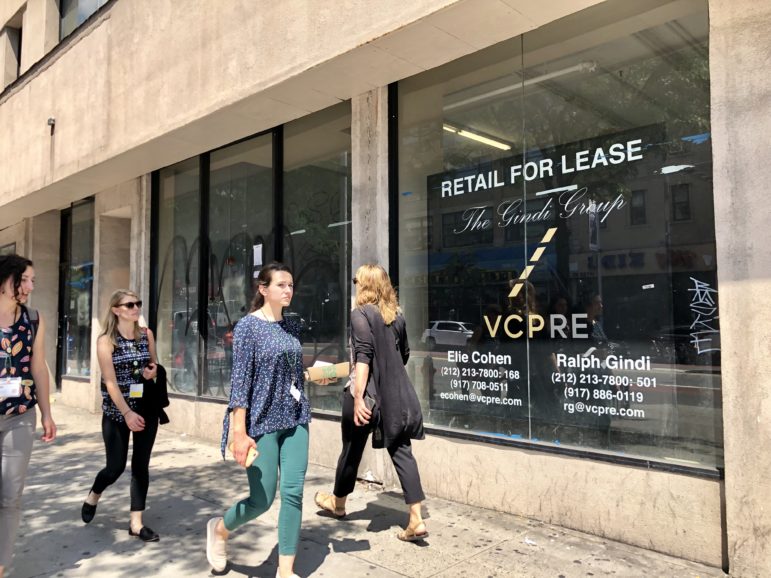‘My businesses are just two of the thousands of small businesses in New York City run by women and people of color. The lack of government support for these businesses is a racial and economic justice issue.’

City Limits / Jeanmarie Evelly
A vacant storefront in Harlem.New York City is reopening. But for the city’s small businesses, the crisis isn’t even close to over. As small business owners who come from and care for this city, we expect our government to support us and the city’s local economy.
The hurdles we’re dealing with are financial. My business got a small amount from the Paycheck Protection Program (PPP)—not a lot, because we don’t have a large staff. It was helpful, but our rent didn’t stop. Our utility bills didn’t stop. PPP doesn’t address those issues.
We also applied for and eventually received an Economic Injury Disaster Loan (EIDL), but we were initially denied because our credit isn’t good enough. Our credit isn’t perfect because we self-funded our business, because we couldn’t get approved for bank loans in the first place. We didn’t have investors, so we had to do it ourselves. And when we needed the government to help us, we were at a disadvantage because of these historical barriers.
This trend isn’t unique to me. Unfortunately, the federal government doesn’t collect data on individual business lending, and they aren’t disclosing all the information about who got PPP and EIDL funds. But a national online survey found that only 12 percent of Black and Latinx small business owners who applied for PPP received the money they requested.
My businesses are just two of the thousands of small businesses in New York City run by women and people of color. The lack of government support for these businesses is a racial and economic justice issue. The federal government is not doing its job, and so far, the city is failing us too. Thankfully, the mayor announced on Aug. 11 that he’s restoring the Commercial Lease Assistance program that had been eliminated from the Fiscal Year 2021 budget; before that, business owners were facing the continuation of the pandemic without any legal support. Even the widely-praised outdoor dining program has regulations that change constantly, making it costly and difficult for small businesses to run without violating city rules.
 CityViews are readers’ opinions, not those of City Limits. Add your voice today!
CityViews are readers’ opinions, not those of City Limits. Add your voice today!
The problem is simple: without income, we can’t pay rent. If there is no commercial rent relief, the impact of COVID-19 will cause thousands of businesses to close, and the closures will ripple out into New York’s most impacted neighborhoods. In Crown Heights, for example, near where my businesses are located, 49 percent of neighborhood jobs were at small businesses as of 2017. Nearly half of those held by workers of color. And that doesn’t include the unregulated or unlicensed businesses, like street vendors, that are more common in immigrant communities. The city’s inaction is exacerbating the racial disparity in the effects of COVID-19 that will further hamper a just recovery.
By failing to pursue rent relief, elected officials are choosing to place the greatest burden on tenants, including women of color, who are even less able to afford it. This is unacceptable. We need to cancel rent and pass commercial rent stabilization now, so that economic injustice and racial discrimination are not baked into New York’s recovery.
Marva Babel is the co-owner of Ode to Babel and Good Life BK. She is a member of the NYC Artist Coalition, part of United for Small Business NYC.









One thought on “Opinion: Will the City Step Up for Black and Latinx-Owned Small Businesses?”
Instead of canceling rent why not have the city provide you with rent vouchers. You do realize that many landlords are also small business owners. Canceling rent can mean forclosure and the inability to support their family. And if buildings go into forclosure that would be a disastrous affect on the city. This opinion piece is short sighted and self serving. What about the city providing you with vouchers to pay your rent? Nothing in free and landlords should not be held responsible- just like small business